Who is the Quarter Century Champion of the Premier League?

In this chapter, some elemental PANDAS data analysis will be performed, when we are facing “.csv” files in front of us. Dataset of interest contains results from every Premier League match from 1993-1994 to 2017-2018. Columns include Division (denoted as E0), HomeTeam, AwayTeam, FTHG (final time home goals), FTAG (final time away goals), FTR (full time result), HTHG (half time home goals), HTAG (half time away goals), HTR (half time result), and season. The dataset could be obtained from Premier League dataset. Next figure presents last 20 rows of the initial DataFrame.
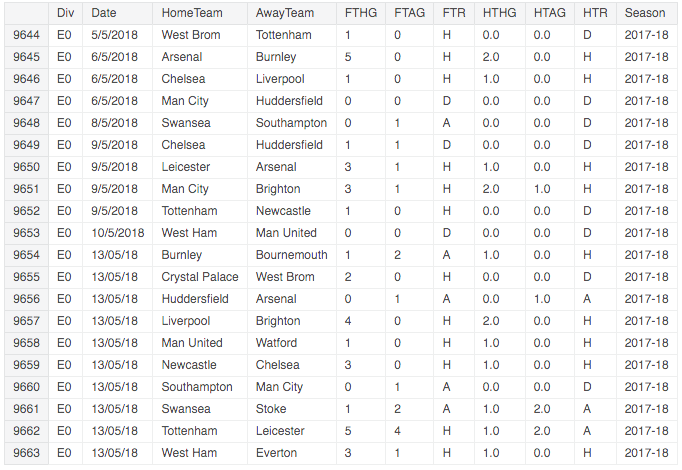
The main task in this short chapter will be to announce the Quarter Century Champion of the PL, based on all results recorded in the table. To complete that task, we must do some basic DataFrame transformations.
- For the beginning, we will import two required python libraries, read original csv file and write it into a variable.
import numpy as np
import pandas as pd
data = pd.read_csv("../input/EPL_Set.csv")
- Let’s see the names of all clubs which played in the PL from 1993 to 2018:
clubs = data['HomeTeam'].nunique()
clubs
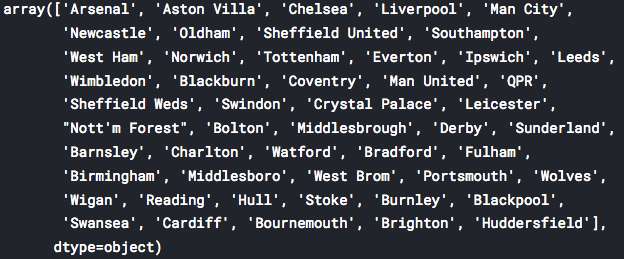
- nunique function will be used to calculate overall number of clubs which played during the period of 25 last years:
clubs = data['HomeTeam'].unique()
clubs

-
If we want to proclaim the champion, the task will be to create a new data frame which will present the number of wins, draws and losses (home and away), for each club from PL.
-
Draw games
We will start with extracting draw games from the initial DataFrame.
Draws = pd.DataFrame()
Draws = data[(data['FTR']=='D')]
Draws.head(10)

Now we want to make two lists, one for presenting numbers of draw games for each club separately (played home), and second one for presenting numbers of draw games for each club (played away).
Draws_Teams_Home = []
for team in clubs:
Draws_Teams_Home.append((team,
Draws[Draws["HomeTeam"] ==team]["Season"].count()))
Draws_Teams_Away = []
for team in clubs:
Draws_Teams_Away.append((team,
Draws[Draws["AwayTeam"] ==team]["Season"].count()))
Let’s print only Draws_Teams_Home to see how it looks like.
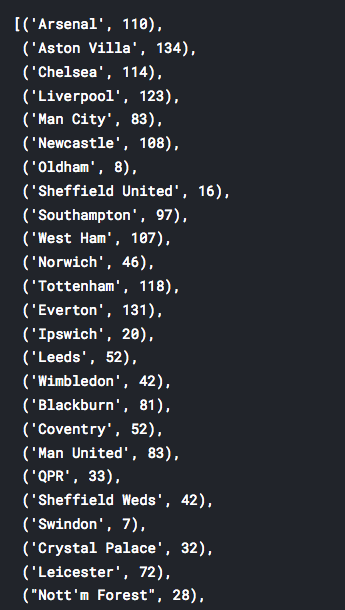
Now it is the time to extract all the wins from the table, and than to calculate numbers of wins for each club (home/away)
All_Wins = pd.DataFrame()
All_Wins = data[(data['FTR']=='H') | (data['FTR']=='A')]
Wins_Teams_Home = []
for team in clubs:
Wins_Teams_Home.append((team,
All_Wins[(All_Wins["HomeTeam"] ==team)
& (All_Wins["FTR"] =='H')]["Season"].count()))
Wins_Teams_Away = []
for team in clubs:
Wins_Teams_Away.append((team,
All_Wins[(All_Wins["AwayTeam"] ==team)
& (All_Wins["FTR"] =='A')]["Season"].count()))
Further, lists of data which are created previously, will be transformed to a new data frame columns.
df_home_wins = pd.DataFrame(Wins_Teams_Home,
columns=['team', 'WinsHome'])
df_away_wins = pd.DataFrame(Wins_Teams_Away,
columns=['team2', 'WinsAway'])
df_home_draws = pd.DataFrame(Draws_Teams_Home,
columns=['team3', 'DrawsHome'])
df_away_draws = pd.DataFrame(Draws_Teams_Away,
columns=['team4', 'DrawsAway'])
And let’s print one of them to see what we have got.
df_home_wins
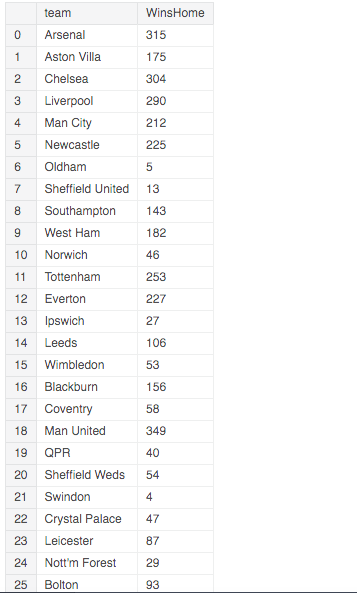
We have transformed draw and win games, so the same procedure will be performed with the lost games.
Losses_Teams_Home = []
for team in clubs:
Losses_Teams_Home.append((team,
All_Wins[(All_Wins["HomeTeam"] ==team)
& (All_Wins["FTR"] =='A')]["Season"].count()))
Losses_Teams_Away = []
for team in clubs:
Losses_Teams_Away.append((team,
All_Wins[(All_Wins["AwayTeam"] ==team)
& (All_Wins["FTR"] =='H')]["Season"].count()))
df_home_losses = pd.DataFrame(Losses_Teams_Home,
columns=['team5', 'LossesHome'])
df_away_losses = pd.DataFrame(Losses_Teams_Away,
columns=['team6', 'LossesAway'])
Now, we have all required information. Let’s first create a new DataFrame with only wins and draws.
Games_Statistic = pd.concat([df_home_wins,df_away_wins,
df_home_draws,df_away_draws],axis=1)
Games_Statistic = Games_Statistic.drop(['team2',
'team3','team4'], axis=1)
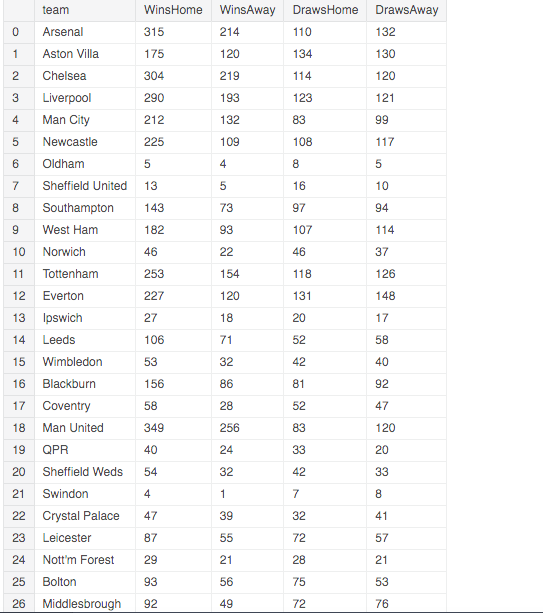
Secondly, information about lost games for each team in a new DataFrame named Games_Summary will be added:
Games_Summary = pd.concat([Games_Statistic,
df_home_losses,df_away_losses],axis=1)
Games_Summary = Games_Summary.drop(['team5', 'team6'], axis=1)
Games_Summary
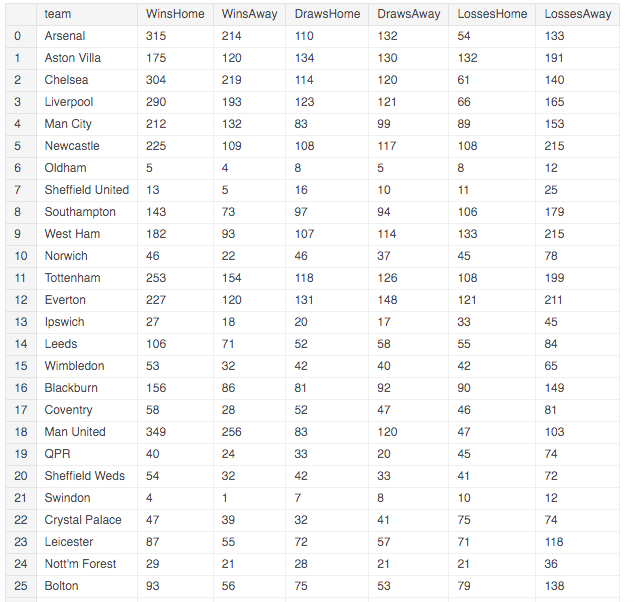
New DataFrame is completed. We have a good insight from it about performances of each club from PL.
- Next, we will add a new column with overall number of played games for each club. Also, we will rearrange position of columns in our dataframe. We want the position of the ‘number of played games’ column to be immediately after the team name column.
Games_Summary['Played games'] =
Games_Summary.iloc[:,-7:].sum(axis=1)
Games_Summary = Games_Summary[['team','Played games',
'WinsHome','WinsAway','DrawsHome','DrawsAway',
'LossesHome','LossesAway']]
- As it was said at the beginning, the task of this chapter is to calculate the Quarter Century Champion of PL. For finalization of that task, we will create a new column, ‘Points’, which will be equal to the number of points won for all played games. Of course, every win is equal to 3 points, every draw game will be presented with 1 point.
Games_Summary['Points'] = (Games_Summary['WinsHome']
+ Games_Summary['WinsAway'])*3 + Games_Summary['DrawsHome']
+ Games_Summary['DrawsAway']
Games_Summary = Games_Summary.sort_values(by=['Points'],
ascending = False)
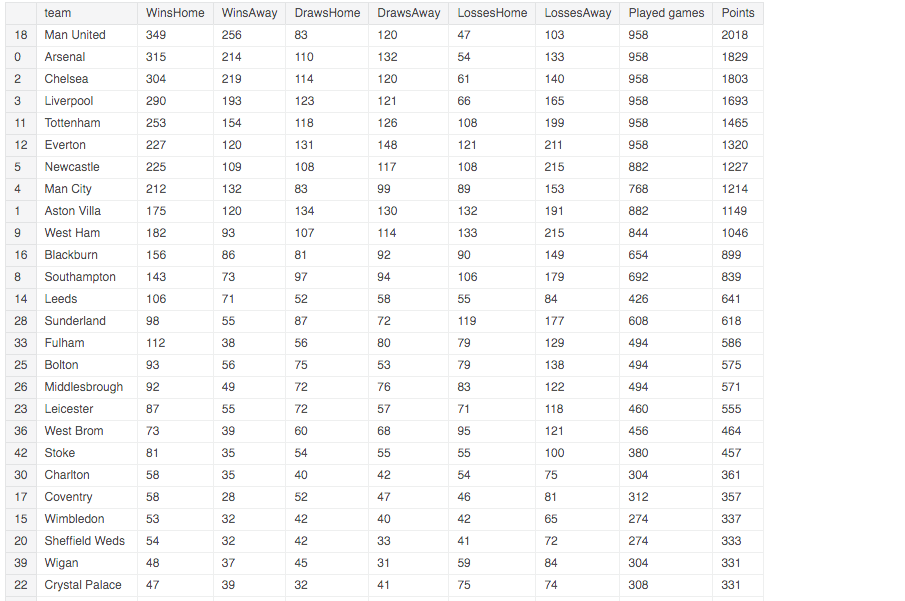
And we have a champion!!! Manchester United!!!
Interesting fact… In the period 1993 - 2018, Man United have won 2018 league points.
In the next announcement, we will try to find some other interesting facts about the Premier League. Of course, pandas library will be again our best friend.
